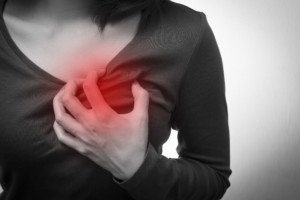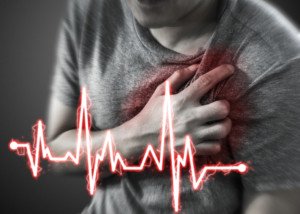
“There are many thoughts as to why one can experience palpitations after a meal,” begins Alvaro Waissbluth, MD, an Ohio-based heart surgeon board certified in interventional cardiology and cardiovascular diseases, and founder of Eat Tank, an educational nutrition initiative that provides simple tools and practical knowledge for better understanding food.
Sometimes the palpitations are described as a “fluttering” heartbeat.
Dr. Waissbluth continues, “One may ingest caffeine or alcohol during the meal and these often cause palpitations.
“Also, one may have a specific food sensitivity which can be mild and manifest in many different ways – such as MSG or shellfish or gluten – and one of the manifestations is frequently palpitations.
“Also, it is possible that the esophagus or stomach could be irritated – people often have esophagitis or gastritis without really knowing it, and eating may irritate their GI tract further – causing angst and discomfort and then palpitations.”
Causes of a fluttering heart after eating continue…
“Also, it is important to note that after you eat, blood flow is automatically redirected away from the muscles and towards the stomach and intestines,” explains Dr. Waissbluth.
“This change can be quite dramatic after a large meal, and the change can lead to people ‘feeling’ their hearts beating differently.”
The fluttering heart after a meal can be mental in origin.
“Occasionally mealtimes can be anxiety provoking for a variety of reasons, and anxiety is a common cause of palpitations.”
When your heart flutters after eating, does this suggest a serious cardiac problem?
Dr. Waissbluth says, “Palpitations are typically not serious, but they can represent a more serious issue – especially if one experiences other symptoms with them – like chest pain, shortness of breath or dizziness.
“It is always recommended to go see your doctor if you have palpitations just to make sure everything is okay.
“The best way to improve palpitations is to try and remove the cause – which takes some figuring out – and oftentimes there is no cause – they ‘just happen.’”
Reducing that fluttering heartbeat may mean elimination of alcohol or caffeine.
And for others it will require avoidance of stress at mealtime. Put away the smartphone and financial reports.
Tell yourself you won’t think about your bills. Just relax and enjoy your meal.
Avoid if possible eating with the so-called toxic people in your life.
“Assuming there is no worrisome underlying heart disease that needs addressed, there are some medicines people can take to try and diminish the sensations/palpitations,” says Dr. Waissbluth.
“But remember, they have side effects, and sometimes the side effects are worse than the palpitations.”

Dr. Waissbluth is affiliated with Atrium Medical Center and has been in practice for 25+ years. Visit Eat Tank.
 Lorra Garrick has been covering medical, fitness and cybersecurity topics for many years, having written thousands of articles for print magazines and websites, including as a ghostwriter. She’s also a former ACE-certified personal trainer.
Lorra Garrick has been covering medical, fitness and cybersecurity topics for many years, having written thousands of articles for print magazines and websites, including as a ghostwriter. She’s also a former ACE-certified personal trainer.


























